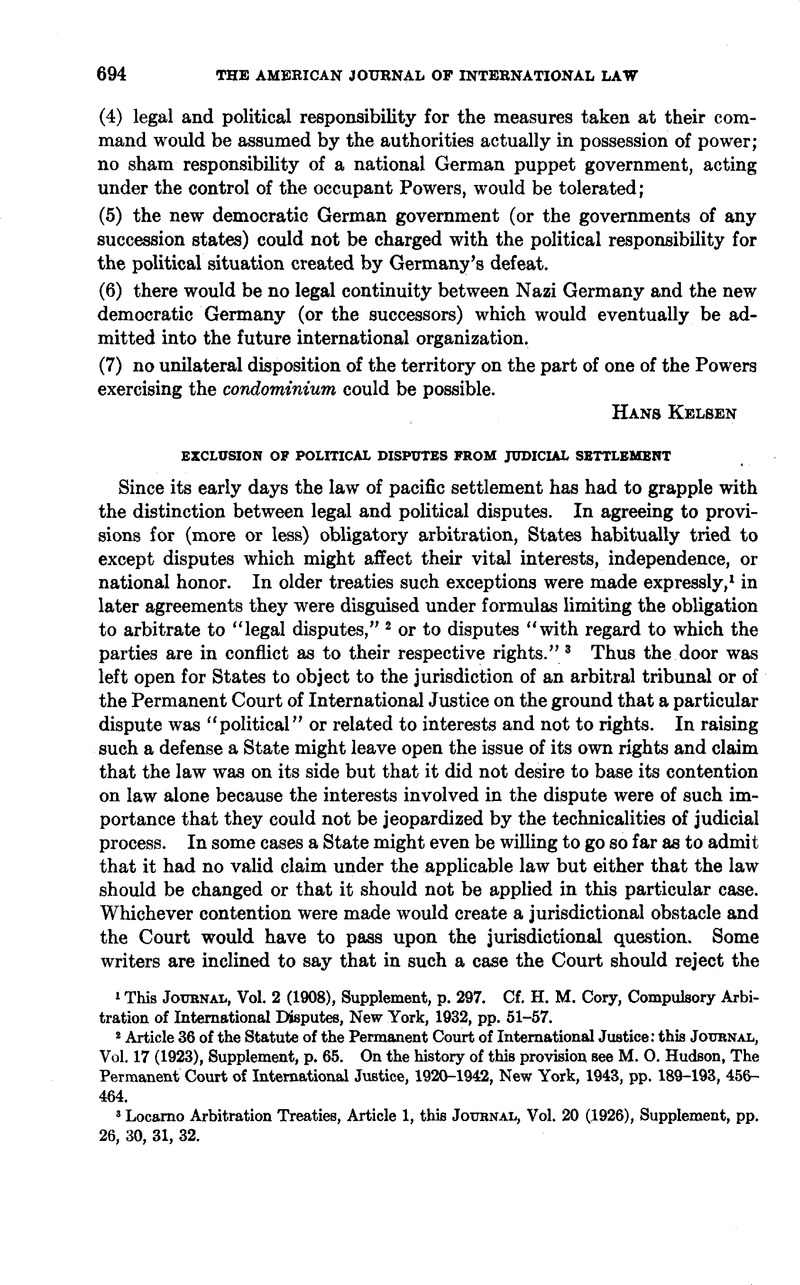Published online by Cambridge University Press: 25 April 2017

1 This Journal, Vol. 2 (1908), Supplement, p. 297. Cf. H. M. Cory, Compulsory Arbitration of International Disputes, New York, 1932, pp. 51–57.
2 Article 36 of the Statute of the Permanent Court of International Justice: this Journal, Vol. 17 (1923), Supplement, p. 65. On the history of this provision see M. O. Hudson, The Permanent Court of International Justice, 1920–1942, New York, 1943, pp. 189–193, 456464.
3 Locarno Arbitration Treaties, Article 1, this Journal, Vol. 20 (1926), Supplement, pp. 26, 30, 31, 32.
4 Kelsen, H., Law and Peace in International Relations, Cambridge, Mass., 1942, pp. 159–168 Google Scholar; same author, Compulsory Adjudication of International Disputes, this Journal, Vol. 37 (1943), pp. 397–406.
5 But see Lauterpacht, H., The Function of Law in the International Community, London, 1933, pp. 187–189, 205–206Google Scholar.
6 Article 5. 108 League of Nations Treaty Series, p. 191.
7 Records of the Fifth Assembly (1924), Plenary, p. 484.
8 27 League of Nations Treaty Series, p. 419.
9 Hudson, work cited, pp. 689–690. A similar reservation was made by Great Britain when acceding to the Geneva General Act of 1928: 107 League of Nations Treaty Series, pp. 529–531.
10 Great Britain, Parliamentary Papers, Misc. No. 12 (1929), Cmd. 3452, pp. 6–7.
11 Hudson, pp. 683, 685, 691–2, 695–6, 699–700. Similar reservations were made by Australia, Canada, India and New Zealand when acceding to the Geneva General Act: 107 League of Nations Treaty Series, pp. 531–536.
12 Hudson, p. 686.
13 Same, pp. 692–3.
14 Same, p. 693.
15 Same, p. 698.
16 Same, p. 688. In accepting the Geneva General Act, France made a more precise reservation providing that “disputes which the parties or one of them may have referred to the Council of the League of Nations will not be submitted to the procedures described in this Act unless the Council has been unable to pronounce a decision under the conditions laid down in Article 15, paragraph 6, of the Covenant”: 107 League of Nations Treaty Series, p. 529.
17 Hudson, p. 694. Similarly, Italy’s reservation made in accepting the General Act of Geneva excepts “disputes which may be submitted to the Council of the League of Nations in virtue of one of the provisions in the Covenant”: 111 League of Nations Treaty Series, p. 415.
18 Hudson, p. 697. This reservation was not repeated by Peru in her instrument of accession to the Geneva General Act.
19 This time-limit may be too long; the declarations of the members of the British Commonwealth did not hesitate to require the submission of the dispute to the Council within ten days after notification.